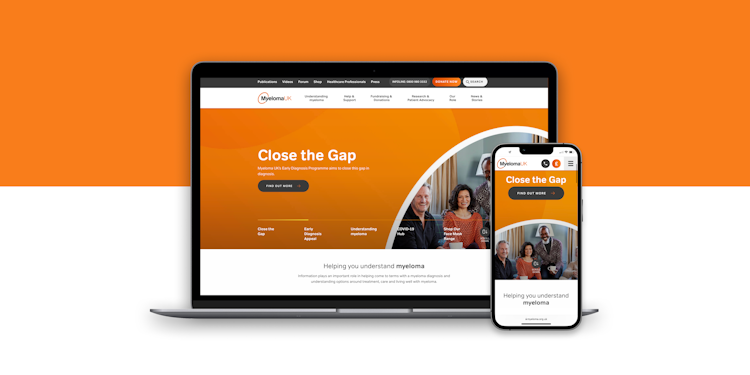Audience insight project for Myeloma UK
We provided actionable audience insights for Myeloma UK with user research.

Client: Myeloma UK
Sector: Charity
Website: Myeloma.org.uk
Services: Audience Research, including User Testing
We carried out a research project with people living with myeloma, their carers and healthcare professionals to understand their current experiences, behaviours, and attitudes towards the Myeloma UK website. This research was pivotal to recommend what their digital channels must consider to become genuinely user-focused in the future.
Myeloma UK is the leading charity for myeloma – a type of blood cancer. Their work sees them needing to engage with various audience groups seeking information and support. These include newly diagnosed and relapsing patients, family members or carers, and health care professionals, such as consultant haematologists and specialist nurses.
They approached Fresh Egg as they were looking for help to understand more about these different audiences, especially with the website's role in their needs from the charity.
With a website redevelopment in their strategic roadmap for the next 12 months, the charity wanted to make sure that this started with having clear insights from audiences to be as user-focused as possible and considering the organisation's organisational requirements.
Key project outcomes
Immediate impact
Our recommendations provided an immediate impact
Better UX
The insights helped Myeloma build a better user experience
Crucial insights
The audience research provided vital intel for a new web build
The challenge
Myeloma UK's current website has been an essential tool for the charity's many audiences to do several things, including research, read or watch content, download information sheets, find support groups, or discuss topics in a forum. As with many websites, it has had many content pages added to it over the past years, plus various changes to navigation and information architecture and features, including the addition of a search function.
All of this, plus a CMS that was not flexible enough for current requirements, meant that the charity needed to consider how they could redevelop the website.
With people and their particular and often sensitive or emotionally-driven needs in mind, it was necessary that any new iterations of a website would be well and truly 'user focused'.
Myeloma is more common in older people, and as a result, our research focused on the needs of more senior users. While many older users have good technical skills, none were 'native' internet users, and as a result, they tend to be less confident using websites. Learning more about the needs and behaviours of older users was a crucial part of the research.
Without any recent audience research in this area, the project's objective was to understand the current experience, behaviour, attitudes and needs of people living with myeloma, their carers and healthcare professionals. This research enabled us to user-focused recommendations for the new website build.
"Working with Fresh Egg on this project was both enjoyable and insightful. They helped us challenge our thinking about our audiences' needs and provided detailed and helpful user-led insights into what and where we need to focus our attention to ensure the next evolution of our website meets the needs of our users as much as possible. On a personal level, the team were a pleasure to work with, and both internal and external stakeholders gave me positive feedback on their experience with the Fresh Egg team."

Emma Pellegrini, Head of Digital, Myeloma UK

We can help with audience research
Our solution
To provide Myeloma UK with the information they needed, we applied our tried-and-tested approach to research, which involved the following phases:
Internal stakeholder workshop
The project started with a workshop involving a group of internal stakeholders from the charity who had extensive knowledge and insights into the primary audiences in scope.
They represented different areas of the organisation, including marketing and communications, fundraising, patient support and health care professional services.
We facilitated two different exercises designed to extract essential information quickly and easily:
- Empathy mapping – from the audience's perspective, what are the goals, needs, actions, touchpoints, and pain points they have currently
- Journey mapping – what were the typical journeys of the different audience groups, and how did the website feature in these?
Outputs from the workshop were used to support the research and analysis phases of the project, plus provided some helpful reference materials that could be utilised ongoing by Myeloma UK teams when they needed to consider the audiences when producing work.
Audience interviews and user testing
Taking the insights gained from the workshop, we developed a set of questions and user tests for each of the four audience groups.
We then conducted around 20 research interviews with a sample of the audience group. These were in the form of in-depth, hour-long video sessions that included:
- Exploratory questions - designed to understand more about the overall journeys, experiences, needs, attitudes, behaviours and 'moments of truth' that people had, especially those that involved the website
- User testing exercises - We asked people to carry out a series of tasks using the Myeloma UK website to observe behaviour and capture additional feedback. The tasks included asking people to find specific content or information, look for a service, donate or comment on brand aspects.
We recorded all the sessions and took notes for future reference.
Analysis and delivery
Once the research phase was complete, we systematically analysed the research sessions and stakeholder workshop outputs, extracting key insights and learnings.
Once completed, we collated these and wrote the findings into the research report that summarised the learnings and our recommendations and the considerations for the new website and other marketing or general communications activities.
We played the recordings back to a Myeloma UK group of stakeholders, including the digital team, a Board Trustee, and the Chief Executive.

The outcome
As a result of this project, Myeloma UK now has specific recommendations for creating a new version of the website that truly represents the needs of its core audiences.
The prioritised recommendations highlight the key focus areas for the forthcoming web build. Other actions were given that can be implemented before a new website, impacting important KPIs (such as service usage or fundraising) in the shorter term.
This work allows the charity to hit the ground running for website scoping, thus saving them critical time and monetary investment.
Additionally, there are numerous recommendations that other areas of the organisation can use to improve how they engage people better.
As was played back to the charity, this project has identified some exciting and achievable opportunities to help make the Myeloma UK website even more user-focused in the future.
Significantly, this project will help those people who have been diagnosed with an incurable cancer gain even more support and reassurance at what is often a difficult time.
Loading
Talk to us about discovering audience insight
Tell us your needs and we'll be in touch
Our latest work
Do you have a challenge we can help you with?
Let's have a chat about it! Call us on 01903 285900



